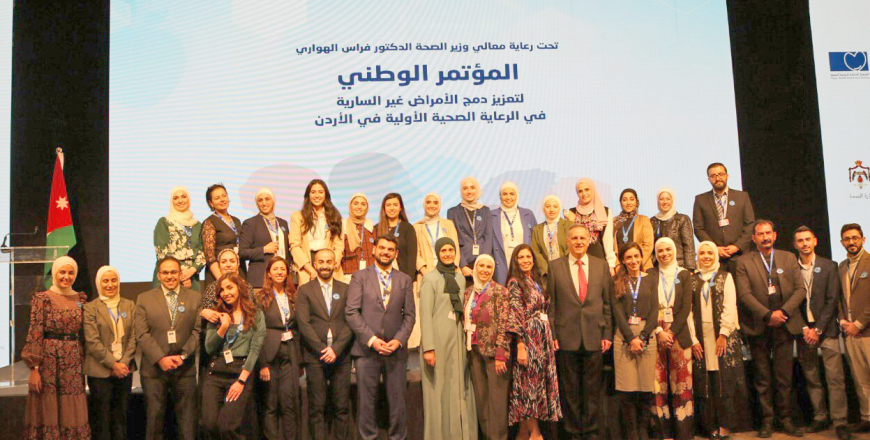You are here
National Noncommunicable Diseases Conference concludes
By JT - Dec 05,2022 - Last updated at Dec 05,2022

Participants pose for a photo during a conference on noncommunicable diseases, organised by the Ministry of Health, the Royal Health Awareness Society and the World Diabetes Foundation (Photo courtesy of organisers)
AMMAN — The Ministry of Health, the Royal Health Awareness Society and the World Diabetes Foundation organised a two-day conference under the title: “Strengthening the Integration of Noncommunicable Diseases (NCDs) into Primary Health Care in Jordan” in Amman from November 28-29.
The conference aimed to promote the integration of NCDs prevention and treatment services into primary healthcare through the creation of a platform convening national stakeholders and sharing advanced knowledge and progress, exploring interventions and generating recommendations for the post-pandemic world, according to a statement from organisers.
Over the two days, the conference included 22 panel discussions and presentations from the organising entities and various national stakeholders and partners, including the Ministry of Education, UN agencies, as well as Jordanian civil society organisations focused on NCDs and humanitarian response.
This conference sought to share knowledge and explore interventions in the NCD space, building on national direction and guidance, to address the current burden of noncommunicable diseases, as well as continue integration efforts within the primary healthcare system.
During the closing ceremony of the conference, Anas Al Mohtasib, director of Non-Communicable Diseases directorate at the Ministry of Health, thanked all participants and speakers for their contributions.
Amal Ireifij, Director General of the Royal Health Awareness Society, said: “RHAS is looking forward to develop an action plan to address conference recommendations along with MoH and stakeholders”.
Jakob Sloth Madsen, Senior Advisor from the World Diabetes Foundation, said: “Jordan is providing a model that could inspire similar contexts regionally and globally, and the success in Jordan is due to high level of government ownership and political commitment, academic guidance, strong stakeholders and partners network, and opportunities for broadened co-financing”.
The conference was attended by more than 180 invitees from several ministries, civil society, and international organisations active in the field of non-communicable diseases.
NCDs are the leading cause of morbidity and mortality in Jordan, constituting 78 per cent of the total deaths, according to the Jordan National Stepwise Survey (STEPS) for Noncommunicable Disease (NCD) Risk Factors (2019) conducted for both host and refugee communities.
NCDs place considerable national health and economic burden especially due to their high prevalence where 22.1 per cent suffer from high blood pressure, and 20 per cent within the age range of 45-69 years suffer from diabetes and 18 per cent suffer from depression in Jordan.
Related Articles
AMMAN — Minister of Health Feras Al Hawari met with a delegation from the World Diabetes Foundation (WDF) and the Royal Health Awareness Soc
AMMAN — The 2019 Jordan survey for Non-Communicable Disease risk factor surveillance (STEPS-wise) was launched on Sunday to support Jordan's
AMMAN — Noncommunicable diseases (NCDs) are the leading cause of morbidity and mortality in Jordan, constituting 78 per cent of the total de













